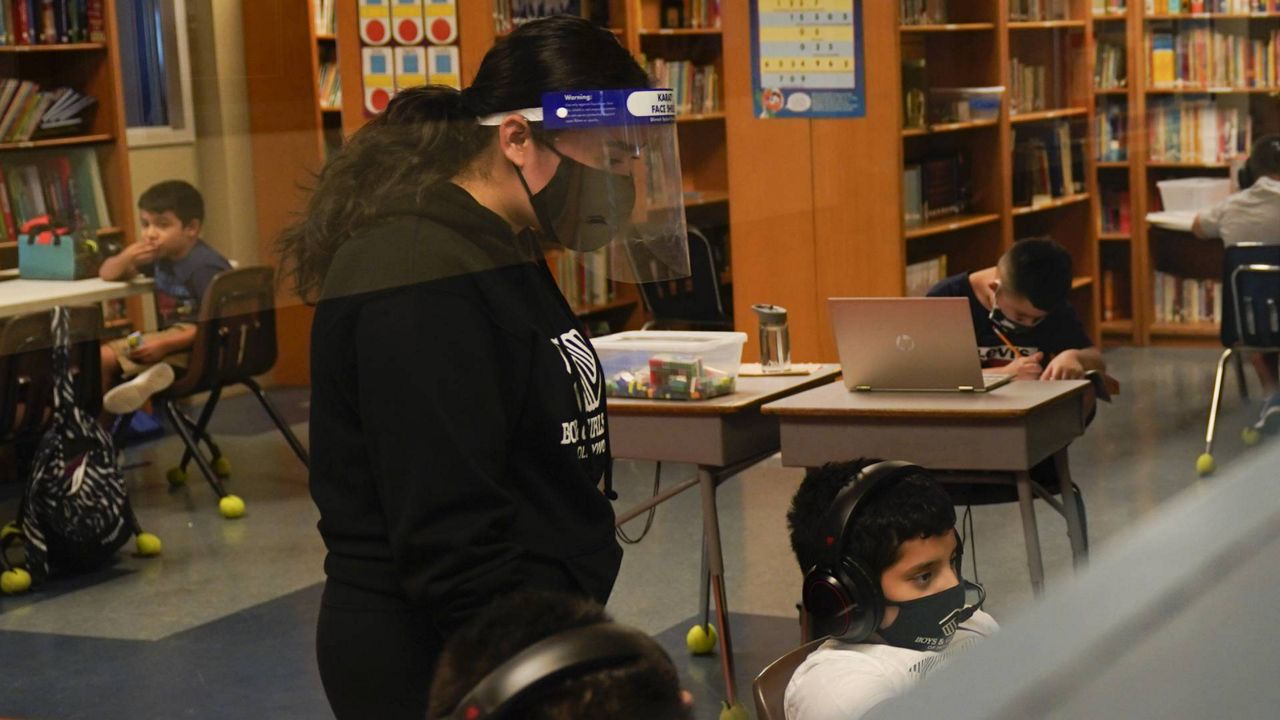LOS ANGELES (CNS) — Although all schools within Los Angeles Unified have reopened, the vast majority of students are opting to continue remote learning, with the district reporting Monday that just 7% of high schoolers, 12% middle schoolers and 30% of elementary children are back in the classroom.
"Unfortunately, the number of smiling faces we see on playgrounds differs greatly in schools across the Los Angeles area," Superintendent Austin Beutner said Monday during his weekly address about the almost 650,000 students served by LAUSD schools that were forced to close in March 2020 due to coronavirus. Schools began reopening last month for the school year ending June 11.
What You Need To Know
- Although all schools within LA Unified have reopened, the vast majority of students are opting to continue remote learning
- The district reported Monday that just 7% of high schoolers, 12% middle schoolers and 30% of elementary children are back in the classroom
- Through a parent survey conducted in the spring, the district had anticipated more than twice as many middle and high school students would return
- Something Beutner said he thinks will make a difference in students coming back to the classroom is the availability of vaccines for those under age 16
Through a parent survey conducted in the spring, the district had anticipated more than twice as many middle and high school students would return. LAUSD implemented extensive district-wide safety measures, regular COVID-19 testing of all students, and vaccines for anyone age 16 and up to accommodate students being back in the classroom. For COVID safety reasons, most instruction for middle and high school students remains online, even for those who attend school in person.
"As students return to schools, patterns are emerging among families who have chosen for their child to return in-person, and those remaining online," Beutner said. "Elementary schools have higher in-person enrollment in more affluent communities. In high schools, we see the opposite — more students from lower-income communities returning to school in-person than their peers in higher income communities."
Something Beutner said he thinks will make a difference in students coming back to the classroom is the availability of vaccines for those under age 16. The Food and Drug Administration on Monday authorized the Pfizer vaccine for youth aged 12 to 15.
"The availability of vaccines for children ages 12 to 18 is an important part of the path to recovery in schools," Beutner said. "Ninety percent of the people on a school campus at any point in time are children. Herd immunity won't be reached in schools or in the broader community until children are vaccinated."
The district offers vaccines at 15 school-based neighborhood clinics, and Beutner said the doses will be made available to all students when they become eligible to be vaccinated.
"Our aim is to bring access to the vaccine to every middle and high school in Los Angeles Unified as soon as we can," Beutner said.
Meanwhile, Los Angeles Unified has provided more than 125,000 COVID tests at schools. On an average day, Los Angeles Unified administers about one- fourth of all the COVID tests in the Los Angeles area, making it the single largest provider in the region.
Related Stories
- Some parents call LAUSD protocols way too strict even as playgrounds reopen
- LAUSD board OKs 2021-22 school calendar; no additional classroom time
- Biden says schools should fully reopen this fall, unaccompanied minor migrant surge under control
- Parents help students with safe back to school transition
Last week, the district reported that 15 students and two staff members who were at schools tested positive for COVID-19 in the school-based COVID testing program, which uses contract tracing to identify other students and staff who may have been exposed and need to isolate at home.
Beutner has stressed the need for people to remain vigilant with mask wearing, hand washing and social distancing to protect themselves and others.
The superintendent also continued to advocate for the need for more resources and funding to support students, especially elementary students who have fallen behind in reading and math. The district reports that, for students in kindergarten through third grade, only 48% are proficient readers and only 32% are at the level they need to be at with math.
"That means almost 70,000 children need help now in reading and more than 80,000 children need help in math," Beutner said. "We can't reopen schools and just go back to the way things were. Out of crisis comes the opportunity to do what was once unimaginable. This is a once-in-a-lifetime moment to make things meaningfully better for the children we serve."
WATCH: Superintendent Austin Beutner's Update to the School Community
— Los Angeles Unified (@LASchools) May 10, 2021
VEA: Mensaje del superintendente Austin Beutner a la comunidad escolar. Haga clic en el botón [CC] en el video si desea activar los subtítulos en español.https://t.co/GezWDNqhdQ pic.twitter.com/oW6VulTFU9



